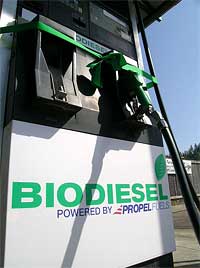 Biodiesel is America’s first advanced biofuel. It is a renewable, low-carbon, clean-burning fuel that is made from a diverse mix of resources such as agricultural oils, recycled cooking oil and animal fats. Biodiesel fuel is made through a process where glycerin is separated from fat or vegetable oil. The process of producing biodiesel leaves behind methyl esters, which is the chemical name for biodiesel, and glycerin, a byproduct sold mostly to be used in soaps and other products.
Biodiesel is America’s first advanced biofuel. It is a renewable, low-carbon, clean-burning fuel that is made from a diverse mix of resources such as agricultural oils, recycled cooking oil and animal fats. Biodiesel fuel is made through a process where glycerin is separated from fat or vegetable oil. The process of producing biodiesel leaves behind methyl esters, which is the chemical name for biodiesel, and glycerin, a byproduct sold mostly to be used in soaps and other products.
Biodiesel is not the same as vegetable oil, and vegetable oil cannot meet biodiesel fuel specifications or be used as a motor fuel. Biodiesel is the only alt fuel to have completed the health effects testing that is required of the 1990 Clean Air Act Amendments. Biodiesel has lower emissions compared to petroleum diesel and biodegrades as fast as sugar.
Biodiesel is commonly blended with traditional diesel fuel. The most common biodiesel blends are B20, which is made up of 20-percent biodiesel and 80-percent petroleum diesel, and B2, which is 2-percent biodiesel and 98-percent petroleum diesel. Certified low-level biodiesel blends can be used in most traditional diesel vehicles without engine modification. The use of higher-level biodiesel blends tends to require engine modification.
Where to Find Biodiesel
Biodiesel is available at a national level. It can be purchased directly from biodiesel manufacturers and producers, petroleum distributors, or at several public pumps throughout the nation. Products can also be purchased on a variety of online resources to make your own biodiesel. Many biodiesel companies partner with local restaurants and food service establishments to collect their used cooking oil to convert into biodiesel.
Cost
The USDA has offered grants for the past few years for producing biodiesel through the Commodity Credit Corporation. The CCC payments effectively reduce the variable cost of additional soybean oil and yellow grease biodiesel. B100 or 100-percent biodiesel cost an average of 8.2 cents per mile, and gets 37 miles per gallon in the city and 45 miles per gallon on the highway.
B20 or a mixture of 80-percent petroleum-based diesel and 20-percent biodiesel cost 6.0 cents per mile, and gets 37 miles per gallon in the city; 45 miles per gallon on the highway.
Unleaded gasoline cost an average of 6.9 cents per mile, and gets 25 miles per gallon in the city; 31 miles per gallon on the highway. Conventional, petroleum-based diesel cost an average of 5.2 cents per mile, and gets 38 miles per gallon in the city and 46 miles per gallon on the highway.
Pollution
Diesel fuels can produce as much as 20 times more toxic particulates than gasoline. Diesels’ smog-forming nitrogen oxide emissions have 20 times greater the emissions of a comparable gasoline vehicle. Biodiesel can result in significant reductions in a number of air pollutants. Particulate matter dropped by almost half when using B100 and by 12 percent when using B20. CO2 dropped by almost 80 percent using B100 and hydrocarbons were reduced by nearly 70 percent using B100 and 21 percent using B20. Carbon monoxide decreased 48 percent with B100, 12 percent using B20.
Biodiesel is overall a cleaner, efficient fuel choice. Find a biodiesel station at biodiesel.org, or research a self-made biodiesel option to help preserve our environment.
Author Bio
This has been a guest blog post by Chelsea Wyles of the Cooler Planet Blog.